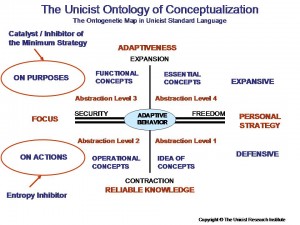Conceptualization sustains any proactive action in the field of adaptive behavior. That is why it applies to individual, institutional and social behavior. Conceptual thinking is an abstract thinking process that is based on discovering the concept at an operational level, emulating their structure in mind, and transforming this emulation into value adding actions. In plain language, conceptualization implies knowing what one is truly doing, having the concepts of the actions, which includes having their functional structure and being able to transform the concepts into value adding actions.

The paradigm shift is given by the conceptual approach to businesses and its integration with the existing technical analytical approach. It allows integrating the knowledge of the empirical observable facts with the knowledge of the “nature of businesses” in order to define what is possible to be achieved and the probability to make it happen.
The research on how the logical thinking process works, allowed defining four levels: operational thinking that deals with the “HOW”, analytic thinking that deals with the “WHAT”, systemic thinking, that deals with the “WHAT FOR” and conceptual thinking that deals with the “WHY”.
Conceptualizing implies being able to have an adaptive behavior sustained by the capacity of apprehending the nature of what one is doing while one is able to apprehend the operational aspects of the actions.
The discovery of the ontogenetic intelligence of nature allowed finding the roots of evolution, involution and mutation.
This intelligence drives the purpose of the living beings in nature based on an active principle that sustains growth, change and mutation, and an energy conservation principle that saves energy while it sustains the purpose. This principle compensates the entropy produced by the active function.
The objective of any thinking process is to be able to emulate the models that underlie the tangible aspects of the world that can be accessed through sensory experiences. The objective of conceptual thinking is to emulate the nature that underlies specific aspects of reality in order to influence the environment.
Functional concepts are cross-cultural and timeless. They remain unchanged as long as a function exists.
Having the concepts of what one is doing allows being extremely effective and flexible. An individual can adopt new operational technologies without needing to change because the concept remains the same.
Conceptualization enhances the human condition.
The History of Conceptualization
The term Concept in Western philosophy can be found in the works of Plato and Aristotle. Their approach drove to the definition of concepts as describing the essence of things defined as a universal realm.
 Ernst Cassirer (Substanzbegriff und Funktionsbegriff) included the definition that concepts not only define the essence of things but also their shape.
Ernst Cassirer (Substanzbegriff und Funktionsbegriff) included the definition that concepts not only define the essence of things but also their shape.
Descartes can be considered as the initiator of a new stage by defining the word “idea” as homologous to concept. But empiricism, with Locke and Hume gave to the terms “idea” and “concept” only a psychological meaning.
Immanuel Kant gave the term “concept” a functional meaning, considering it as the framework of any possible action.
Peter Belohlavek went further. He developed a complexity science approach to deal with complex adaptive systems that integrated philosophy, science and action in a unified field: reality.
He approached what he called extrinsic concepts, which are the ones deposited by humans on the elements of their external reality. He defined that such concepts have a functional structure that emulates the ontogenetic intelligence of nature.
He discovered that such concepts have these three elements:
- A purpose that is homologous to the purpose in nature.
- An active function that is homologous to the active principle in nature.
- An energy conservation function that is homologous to the energy conservation principle in nature.
The knowledge of the structure of concepts makes their access becomes easier and allows using them as the “stem cells” of knowledge and actions.
He also discovered the complementation and supplementation laws that are implicit within each conceptual structure and the concept of anti-concepts that is homologous to the concept of anti-matter.
With the unicist approach, Peter Belohlavek integrated the Western approach and the Eastern approach but focused on a different purpose, which is the adaptation to the environment. This adaptive process is achieved by generating value and profiting from its counterpart in order to foster a sustainable evolution.
Academic Committee
NOTE: The Unicist Research Institute was the pioneer in using the unicist logical approach in complexity science research and became a private global decentralized leading research organization in the field of human adaptive systems. It has an academic arm and a business arm.
https://www.unicist.net/management/wp-content/uploads/2015/08/turi.pdf













